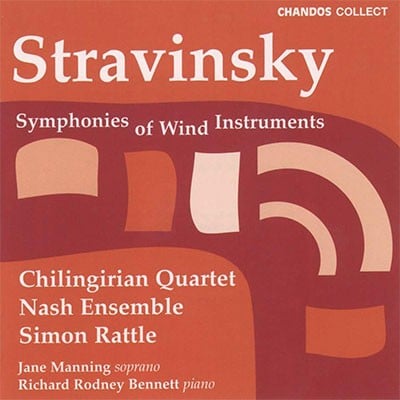Boosey & Hawkes
The bare and enigmatic Three Pieces are in fact contrasting studies in popular, fantastic, and liturgical moods, later titled (when orchestrated as three of the Quatre Etudes) "Dance," "Eccentric," and "Canticle." "Dance" is akin to Stravinsky's adaptations of Russian tunes from the same period. "Eccentric" was inspired by the clown Little Tick. Stravinsky considered the last 20 measures of "Canticle" "some of the best music of that time." Amy Lowell, who heard the Three Pieces in 1915-16 (and evidently read a useful program note), wrote an intriguing poem attempting to "reproduce the sound and movement of the music as far as is possible in another medium"; it is liberally excerpted by Eric Walter White in Stravinsky: the Composer and his Works.
The orchestration of "Eccentric" aligns it clearly with Petrushka; in "Canticle," woodwinds impart warm, suffused colors evocative of Byzantine icons. The arabesques and triplet cadences of "Madrid" are unmistakably Andalusian. Stravinsky: "Many of the musicians who had preceded me in visiting Spain had, on their return, put their impressions on record ... first and foremost Glinka, with his incomparable Jota Aragonaise and A Night in Madrid – and on my side I was delighted to conform with this custom. This piece was inspired by the surprising results of the mixture of strains from the mechanical pianos and orchestrinas in the streets and little night taverns of Madrid."
Repertoire note by Joseph Horowitz
Three short, quirky pieces that make a nice contrast to longer quartets in a programme, and would certainly complement the quartets of Bartók, Shostakovich, Britten, Ravel, Debussy, Fauré, Ives, Janácek or even Haydn. The first piece layers Russian folk fragments and drones, the second was inspired by a performance Stravinsky saw in London by the clown Little Tich, and the third is punctuated with a hymn or chorale. He later transcribed the pieces for orchestra with the titles ‘Dance’, ‘Eccentric’ and ‘Canticle’, to which he added a fourth piece, ‘Madrid’, an arrangement of the Étude for pianola.
Repertoire note by Jonathan Cross

Chilingirian Quartet
Chandos CHAN 6535

